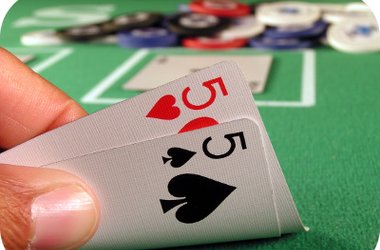Poker is a game of many shifting sides that you have to monitor for best results. It’s very easy to find yourself making decisions in poker that really aren’t sound. As a new player, you may make some mistakes, but there’s nothing wrong with that at all. The key here is to make absolutely sure that you have a solid strategy that will serve you well when it’s time to make a decision that you can live with.
Take small pocket pairs, for example. Some people think that you might as well throw them away because they can’t stand a chance in the face of premium cards, but that’s not true at all. You can’t make those types of generalizations in the world of poker because if you do you’ll end up getting to a point where you lose money. You see, poker is also a matter of psychology as well. If you can bluff and make it seem like you have a monster hand, you can put people on notice. Yet the road to winning pots with small pocket pairs is fraught with hazards that you’ll need to overcome. Here’s what you need to know if you’re really intending on making a big play with this type of situation.
As you might have guessed, it all depends on the type of position that you find yourself in. You might be in early position, which means that you’re one of the first to act in the round. So what do you do in early position? You will definitely want to fold. The reason why folding is so important is because you really don’t want to get bullied by higher hands when you’re in early position. Late position would be another story, and you might have more room to move around when it comes to middle position.
Let’s say that you decide to go against the grain and play those low pocket pairs while you’re in early position. What could happen is that you have a pretty small pot, so even if you win you aren’t going to win big. Over time, this is playing with fire because someone with a better hand is going to either bet heavy, forcing you to call that new bet or fold. In addition, if you raise you’re going to have to face a re-raise and that means having to literally put up or shut up. Not a great way to preserve your bankroll when there’s so much at stake.
What about middle position? As mentioned earlier, your chances of making it big do increase here, but you still need to be cautious. You want to slow play as much as you can, so that you don’t have to reveal what you’re actually holding. Some people are going to want to make value bets, but this is not something that we recommend with a low pocket pair.
The action on the flop will determine what you do next. If the flop comes down in a way that doesn’t give you at least two pair, then you really need to fold. Getting three of a kind is great too, but the real problem that you face is going to be making sure that flop is going to come through for you. If you don’t get anything on the flop you should fold. However, if you do get something on the flop, you’re going to want to push in and possibly even bet a little heavy. What you do also depends on the chip stack that you have in front of you. If you’re not pushing a hard chip stack then it might be time to go ahead and back out of the pot.
And now we come to late position poker play — if you really want to play good poker, being in late position is definitely a good thing. It gives you the power to have as much information as you can about the actions of your opponents. For example, if one of your opponents raises and there aren’t other people jumping in, then you might want to go ahead and fold. However, if other people are playing along, then you will want to limp in as well. However, if things really get expensive, you’re going to need to start backing out before you lose all of your chips.
Some players feel like they should never fold pocket pairs, and that’s really not the case at all. By learning how to play them well you’ll end up faring a lot better than other people will from poker game to poker game — why not check it out for yourself today?
